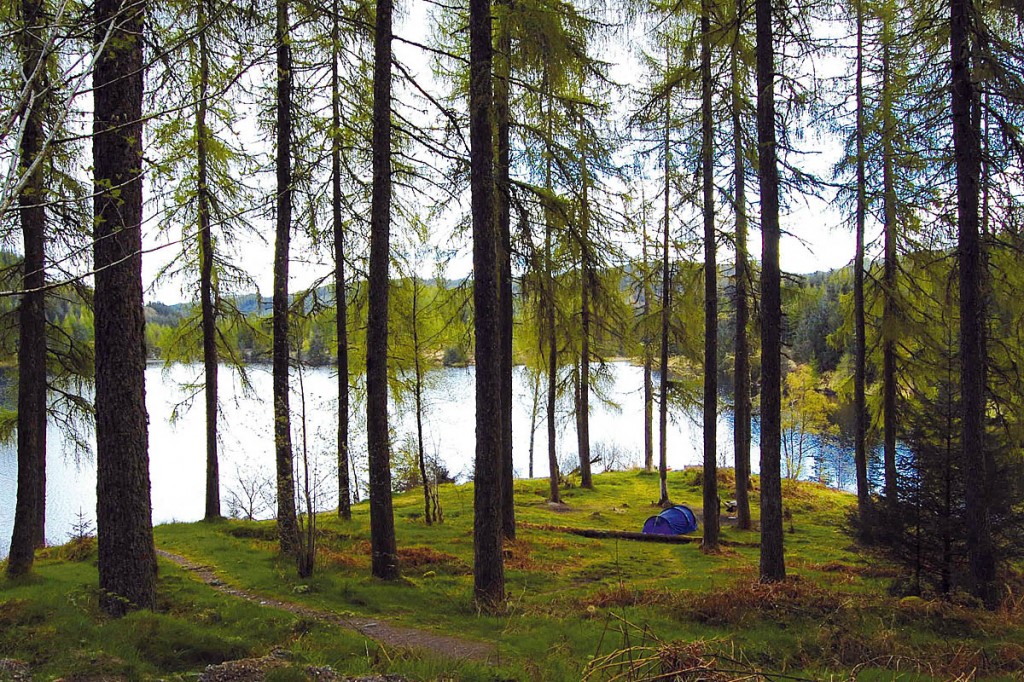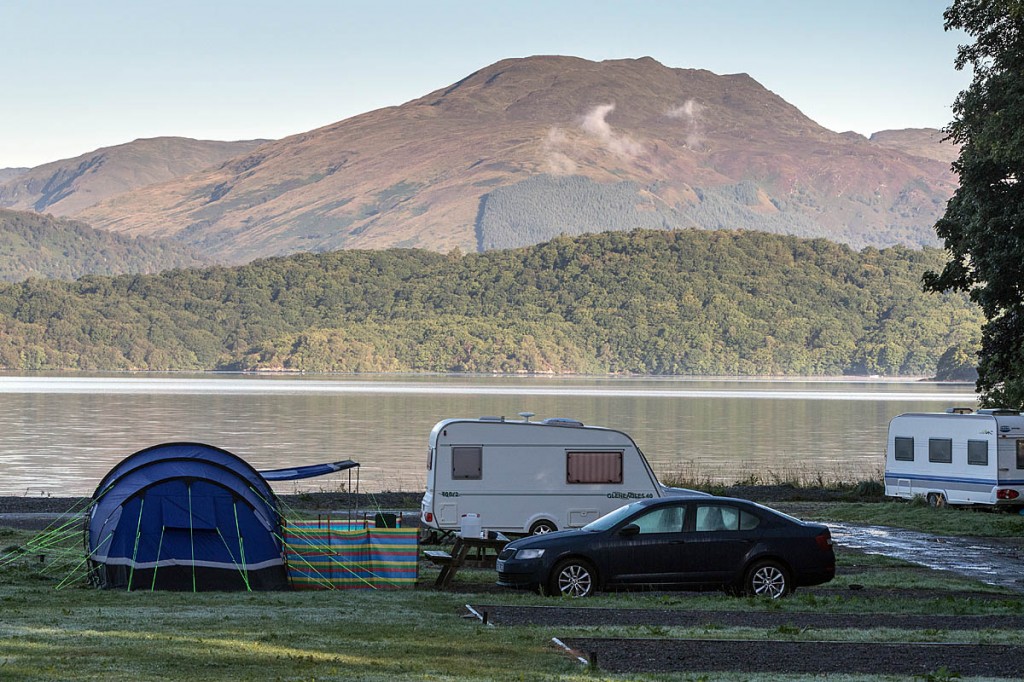The boss of the Loch Lomond and the Trossachs national park said visitors have responded positively to controversial camping bylaws introduced by the authority.
National park authority chief executive Gordon Watson said it was ‘fine-tuning’ the regime in response to feedback from visitors and organisations.
Loch Lomond and the Trossachs National Park Authority will no longer issue permits for motorhomes to camp in laybys and will instead rely on police who will manage the problem using traffic laws.
An authority spokesperson said: “Going back over a number of years, some lochshore laybys have had issues with encampments of motorhomes and caravans creating negative impacts, damaging the environment and preventing access for other visitors.
“Ongoing discussions on how best to manage these issues have agreed that Police Scotland will use roads legislation to deal with unlawful encampments and irresponsible use of motor vehicles in laybys.
“People with campervans and motorhomes can use lochshore laybys to stop and rest – including sleeping overnight if necessary – but encampment on a road, including laybys, is an offence under road traffic legislation and will be managed by Police Scotland accordingly, in cooperation with land owners.
“Camping permit areas for tents adjacent to some lochshore laybys are unaffected.”
But critics of the bylaws said there is evidence the new provisions may be deterring responsible campers who could be displaced into other areas less able to deal with visitor numbers.
Loch Lomond and the Trossachs National Park Authority released figures to show that, between the bylaws coming into force on 1 March and 26 June, 2,272 permits were issued for camping and motorhomes in the park’s camping management zones, where it is now compulsory either to buy a permit or stay on a designated campsite.
Four months after the introduction of the regime, the authority said, after listening to feedback and criticism, it was also moving some permit areas within the Three Lochs Forest Drive in the Trossachs away from forestry operations, increasing the number of places for motorhomes on the Drive and continuing to work on improving signs.
It said it will also improve visitor information and advice on camping areas on the online booking system.
Mr Watson said: “It is early days, but overall there has been a very positive reaction from visitors and we are already seeing a welcome difference in the areas we are trying to protect, with less abandoned campsites and irresponsible firelighting.
“It is great to see such significant positive feedback on the camping experience from the survey responses too.
“There has also been some negative, but mostly constructive feedback and this, along with our own close monitoring, is being used to help us fine-tune things. We’ve said all along that we would do this and the changes we are making demonstrate our commitment to listening and addressing issues where we can.
“We particularly support the contribution from Police Scotland on how inappropriate encampments in some lochshore laybys will be addressed to ensure these locations are accessible for more people to enjoy.
“The changes we have made are all aimed at providing a more positive experience for visitors while protecting our busiest lochshores. We look forward to welcoming people camping and staying in motorhomes, and hearing their views as the season goes on.”
The Land Reform (Scotland) Act 2003 enshrines the right to wild camp responsibly north of the border, and the national park has been accused of undermining the act by insisting campers take out permits or use designated campsites on four per cent of the area, mainly beside lochs, that the authority says is prone to anti-social behaviour and vandalism.
Brendan Paddy, director of Ramblers Scotland, said: “We welcome the park’s decision to stop charging motorhome owners to stay at lochshore laybys and instead use existing laws to tackle anti-social behaviour.
“We urge the park leadership to adopt a similar approach to manage camping in tents.
“Given the worryingly low number of permits issued, we fear the bylaws are making it harder for responsible campers to enjoy the park – particularly people from poorer backgrounds.
“We are also concerned that the hassle, cost and insufficient number of permits may be displacing campers to other areas with fewer resources to support visitors.
“A national park should be a showcase for Scotland’s world-leading access rights but instead campers have fewer rights in prime spots within Loch Lomond and the Trossachs than anywhere else in the country.
“We do not want to see these restrictive bylaws renewed when they are reviewed in 2020.”
Ramblers Scotland pointed out the park’s new statistics show that only 2,272 permits were issued in the first 118 days of the bylaws. This equates to a combined total of 19 permits a day for motorhomes and tents, which it said is very low compared with the previous numbers of people enjoying staying in the camping management zones.
Before the ban, the national park estimated that up to 800 tents were pitched within its boundary on busy weekends, it said.
Loch Lomond and the Trossachs National Park Authority said online surveys have received a strong response rate, with 85 per cent of respondents saying they would recommend staying in one of the new permit areas and 92 per cent found it easy to buy a permit.
The park authority’s rangers are also experiencing a largely positive response from visitors to the camping management zones, it added, with the vast majority adhering to the new bylaws. Communities in some of the areas have also passed on observations of changing attitudes and increases in day visitors.
Richard Graham, chair of St Fillan’s Community Council, said: “The thing that has struck me most since the bylaws were introduced is the lack of damage, graffiti and litter. These are less evident and it also seems to be less congested.
“People who said they would never come back because of anti-social behaviour are coming back. I speak to fishermen who are delighted with the bylaws because they are experiencing less trouble on Loch Earn.
“Families are also coming back to picnic spots that they had just stopped coming to. In our community we are actively encouraging people to come and enjoy the area so this is amazing to see.”
The bylaws created camping management zones around some of the Park’s busiest lochshores where, between 1 March and 30 September, campers must book a permit, unless resting in a layby, or stay in a campsite.
The authority said its Your Park stakeholder forum provides a number of organisations including the Scottish Canoe Association, Mountaineering Scotland and Ramblers Scotland with the opportunity to share ideas and provide feedback from their members as the bylaws are implemented.



Andrew Marshall
28 June 2017So they see positives!!!
Hmmmm bit suspect to me..
NO mention of any impact to other areas..
Just seems like a way to justify expanding this to ALL NPA areas.....
Such a shame they have done this instead of just EDUCATING people... In the end it will not stop the wilful damage etc being caused by cretins who don't give a damn.
Robert Cameron
28 June 2017FAKE NEWS
Munro maiden
28 June 2017What benefits are there to making people BUY a permit as opposed to just applying for one? Are those who can afford to pay automatically responsible campers while those who can't are the undesirables? And where does the money go?
People had a right to wild camp in Scotland. This has now been eroded. That isn't good.
Diddy
29 June 2017I am in favour of the control. Reduction in Chavs lake shore BBQ,s with resultant litter and graffiti has to be good
OldManOfTheHills
29 June 2017As an Englishman I have always been jealous of your Scottish access laws and wish we had the same. Why did the authorities not just ban BBQs and fires - which aren't necessarily permitted in open access areas, and heavily fine people who litter and damage tress?
As for permitting campervans to sleep but not permitting encampment, how am I or any other campervan user to make sense of it while trundling slowly from the south and arriving at dusk/